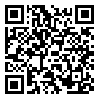Volume 7, Issue 1 (spring 2020)
J Prevent Med 2020, 7(1): 12-1 |
Back to browse issues page
Download citation:
BibTeX | RIS | EndNote | Medlars | ProCite | Reference Manager | RefWorks
Send citation to:



BibTeX | RIS | EndNote | Medlars | ProCite | Reference Manager | RefWorks
Send citation to:
Arabshahi A, Qarlipour Z, Mohammad Beigi A, Izadizeh F S, Mohebbi S. Relationship between social supports received from spouse and adherence to self-care behaviors in patients with high blood pressure in Qom. J Prevent Med 2020; 7 (1) :12-1
URL: http://jpm.hums.ac.ir/article-1-397-en.html
URL: http://jpm.hums.ac.ir/article-1-397-en.html
Amin Arabshahi1 
 , Zabihullah Qarlipour2
, Zabihullah Qarlipour2 
 , Abolfazl Mohammad Beigi3
, Abolfazl Mohammad Beigi3 
 , Fatemeh Sadat Izadizeh4
, Fatemeh Sadat Izadizeh4 
 , Siamak Mohebbi *4
, Siamak Mohebbi *4 



 , Zabihullah Qarlipour2
, Zabihullah Qarlipour2 
 , Abolfazl Mohammad Beigi3
, Abolfazl Mohammad Beigi3 
 , Fatemeh Sadat Izadizeh4
, Fatemeh Sadat Izadizeh4 
 , Siamak Mohebbi *4
, Siamak Mohebbi *4 


1- Student Research Committee, Department of Health Education and Health Promotion, Faculty of Health, Qom University of Medical Sciences, Qom, Iran.
2- Department of Public Health, Faculty of Health, Qom University of Medical Sciences, Qom, Iran.
3- Neuroscience Research Center, Department of Epidemiology and Biostatistics, Faculty of Health, Qom University of Medical Sciences, Qom, Iran.
4- Department of Health Education and Health Promotion, Faculty of Health, Qom University of Medical Sciences, Qom, Iran.
2- Department of Public Health, Faculty of Health, Qom University of Medical Sciences, Qom, Iran.
3- Neuroscience Research Center, Department of Epidemiology and Biostatistics, Faculty of Health, Qom University of Medical Sciences, Qom, Iran.
4- Department of Health Education and Health Promotion, Faculty of Health, Qom University of Medical Sciences, Qom, Iran.
Abstract: (5528 Views)
Introduction: Since Social support received from the spouse and self-care are effective factors in controlling and preventing the complications of chronic diseases such as high blood pressure, this study was conducted to determine the relationship between social support received from spouse and adherence to self-care behaviors in patients with high blood pressure in Qom.
Methods: This cross-sectional and descriptive-analytical study was conducted on 211 patients with primary hypertension referring to urban health centers in Qom city during 2019. The participants were selected using available sampling method. Data collection tools included a demographic questionnaire, a self-care behavior follow-up questionnaire, the Sherborne and Stewart social support questionnaire, a checklist for checking and recording systolic and diastolic blood pressure, and a standard hand sphygmomanometers. Data were analyzed using SPSS version 20 software.
Results: The results showed that there was a direct and significant relationship between social support received from the spouse and the components of self-care behaviors including low-salt diet (P-Value<0.01), medication regimen (P-Value=0.008), weight management (P-Value<0.001), physical activity (P-Value=0.009), and not smoking (P-Value=0.001). There was also a significant inverse relationship between social support received from spouse and systolic blood pressure (P-Value=0.02) and diastolic blood pressure (P-Value=0.017).
Conclusion: The results of this study showed that social support received from spouse should be considered as a factor that affects the level of self-care behaviors and systolic and diastolic blood pressure in patients with high blood pressure.
Methods: This cross-sectional and descriptive-analytical study was conducted on 211 patients with primary hypertension referring to urban health centers in Qom city during 2019. The participants were selected using available sampling method. Data collection tools included a demographic questionnaire, a self-care behavior follow-up questionnaire, the Sherborne and Stewart social support questionnaire, a checklist for checking and recording systolic and diastolic blood pressure, and a standard hand sphygmomanometers. Data were analyzed using SPSS version 20 software.
Results: The results showed that there was a direct and significant relationship between social support received from the spouse and the components of self-care behaviors including low-salt diet (P-Value<0.01), medication regimen (P-Value=0.008), weight management (P-Value<0.001), physical activity (P-Value=0.009), and not smoking (P-Value=0.001). There was also a significant inverse relationship between social support received from spouse and systolic blood pressure (P-Value=0.02) and diastolic blood pressure (P-Value=0.017).
Conclusion: The results of this study showed that social support received from spouse should be considered as a factor that affects the level of self-care behaviors and systolic and diastolic blood pressure in patients with high blood pressure.
Type of Study: Orginal |
Subject:
Special
Received: 2020/01/6 | Accepted: 2020/02/20 | Published: 2020/02/20
Received: 2020/01/6 | Accepted: 2020/02/20 | Published: 2020/02/20
Send email to the article author
| Rights and permissions | |
 |
This work is licensed under a Creative Commons Attribution-NonCommercial 4.0 International License. |




 hums.ac.ir
hums.ac.ir